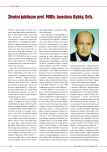-
Medical journals
- Career
Incretins have changed and continue to change treatment strategy for type 2 diabetes
Authors: M. Kvapil
Authors‘ workplace: Interní klinika 2. lékařské fakulty UK a FN Motol Praha, přednosta prof. MUDr. Milan Kvapil, CSc., MBA
Published in: Vnitř Lék 2011; 57(11): 916-918
Category: Birthday
Overview
Incretins are a novel class of drugs indicated for therapeutic intervention in patients with type 2 diabetes. They provide effective and safe therapy. Their advantages include low risk of hypoglycaemia and positive effect on body weight. Literature published so far consistently evidences reduced cardiovascular risk. If long-term prospective studies confirm such an effect, incretin therapy will, together with metformin, become the first line treatment for type 2 diabetes.
Key words:
type 2 diabetes mellitus – gliptins – GLP-1 receptor agonists – cardiovascular risk
Sources
1. Anagnostis P, Athyros VG, Adamidou F et al. Glucagon-like peptide-1-based therapies and cardiovascular disease: looking beyond glycaemic control. Diabetes Obes Metab 2011; 13 : 302–312.
2. Ahrén B. Gut peptides and Type 2 diabetes mellitus treatment. Curr Diab Rep 2003; 3 : 365–372.
3. Amori RE, Lau J, Pittas AG. Efficacy and Safety of Incretin Therapy in Type 2 Diabetes: Systematic Review and Meta-analysis. JAMA 2007; 298 : 194–206.
4. Best JH, Hoogwerf BJ, Herman WH et al. Risk of cardiovascular disease events in patients with type 2 diabetes prescribed the glucagon-like peptide 1 (GLP-1) receptor agonist exenatide twice daily or other glucose-lowering therapies: a retrospective analysis of the LifeLink database. Diabetes Care 2011; 34 : 90–95.
5. Buse JB, Rosenstock J, Sesti G et al. LEAD-6 Study Group. Liraglutide once a day versus exenatide twice a day for type 2 diabetes: a 26-week randomised, parallel-group, multinational, open-label trial (LEAD-6). Lancet 2009; 374 : 39–47.
6. D’Alessio DA, Vahl TP. Glucagon-like peptid 1: evolution of an incretin into a treatment for diabetes. Am J Physiol Endocrinol Metab 2004; 286: E882–E890.
7. Davidson MH. Cardiovascular effects of glucagonlike peptide-1 agonists. Am J Cardiol 2011; 108 (3 Suppl): 33B–41B.
8. Demuth HU, McIntosh CH, Pederson RA. Type 2 diabetes-therapy with dipeptidyl peptidase IV inhibitors. Biochim Biophys Acta 2005; 1751 : 33–44.
9. Dhillon S. Sitagliptin: a review of its use in the management of type 2 diabetes mellitus. Drugs 2010; 70 : 489–512.
10. Drucker DJ, Buse JB, Tailor K et al. DURATION-1 Study Group. Exenatide once weekly versus twice daily for the treatment of type 2 diabetes: A randomised, open-label, non-inferiority study. Lancet 2008; 372 : 1240–1250.
11. Karasik A, Aschner P, Katzeff H et al. Sitagliptin, a DPP-4 inhibitor for the treatment of patients with type 2 diabetes: a review of recent clinical trials. Curr Med Res Opin 2008; 24 : 489–496.
12. Gilbert MP, Pratley RE. Efficacy and Safety of incretin-based therapies in patients with type 2 diabetes mellitus. Am J Med 2009; 122; S11–S24.
13. Richter B, Bandeira-Echtler E, Bergerhoff K et al. Emerging role of dipeptidyl peptidase-4 inhibitors in the management of type 2 diabetes. Vasc Health Risk Manag 2008; 4 : 753–768.
14. Fakhoury WK, Lereun C, Wright D. A Meta-Analysis of Placebo-Controlled clinical Trials Assessing the Efficacy and Safety of Incretin-Based Medications in Patients with Type 2 Diabetes. Pharmacology 2010; 86 : 44–57.
15. Waugh N, Cummins E, Royle P et al. Newer agents for blood glucose control in type 2 diabetes: systematic review and economic evaluation. Health Technol Assess 2010; 14 : 1–248.
16. Williams-Herman D, Engel SS, Round E et al. Safety and tolerability of sitagliptin in clinical studies: a pooled analysis of data from 10,246 patients with type 2 diabetes. BMC Endocr Disord 2010; 10 : 7.
17. Sullivan SD, Alfonso-Cristancho R, Conner C et al. A simulation of the comparative long-term effectiveness of liraglutide and glimepiride monotherapies in patients with type 2 diabetes mellitus. Pharmacotherapy 2009; 29 : 1280–1288.
Labels
Diabetology Endocrinology Internal medicine
Article was published inInternal Medicine

2011 Issue 11-
All articles in this issue
- Current and future options for treatment of osteoporosis
- Chronic pancreatitis in 2011
- Pathophysiological background for incretin therapy: is it capable of more than we think?
- How should we perceive psychosomatic medicine
- Adherence to the international guidelines on the treatment of diabetic leg syndrome – options available in the Czech Republic
- Antibiotic treatment of acute bacterial infections
- Incretins have changed and continue to change treatment strategy for type 2 diabetes
- Modern technologies in diabetology. CSII (Continuous Subcutaneous Insulin Infusion) and CGM (Continuous Glucose Monitoring) in clinical practice
- Is retardation of radiologic progression of ankylosing spondylitis possible?
- Insulin therapy in 2011
- Genetics of monogenic forms of diabetes
- Management of obesity – options, effectiveness and perspectives
- Pathogenesis of type 1 and type 2 diabetes in 2011 – the unifying model of glucoregulation disorder
- An outlook to the future of pharmacotherapy for type 2 diabetes mellitus
- Pharmacotherapy of chronic heart failure after the first decade of 21st century
- Pharmacotherapy following myocardial infarction
- Advances in metabolism and nutrition 2011 and the route to personalized treatment
- Internal Medicine
- Journal archive
- Current issue
- Online only
- About the journal
Most read in this issue- Antibiotic treatment of acute bacterial infections
- Modern technologies in diabetology. CSII (Continuous Subcutaneous Insulin Infusion) and CGM (Continuous Glucose Monitoring) in clinical practice
- Management of obesity – options, effectiveness and perspectives
- Genetics of monogenic forms of diabetes
Login#ADS_BOTTOM_SCRIPTS#Forgotten passwordEnter the email address that you registered with. We will send you instructions on how to set a new password.
- Career

